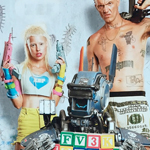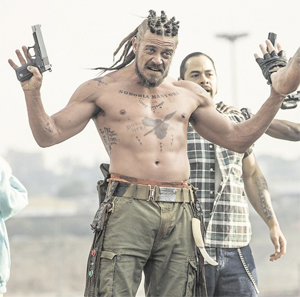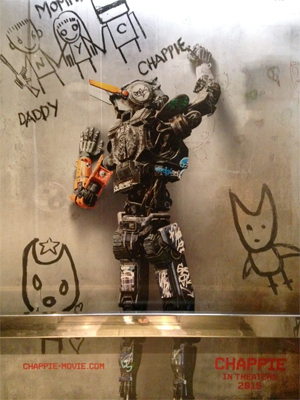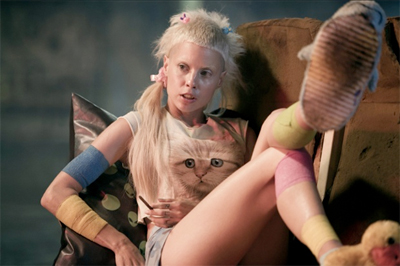 CHAPPIE is a slight but sweet sci-fi story from South Africa’s Neill Blomkamp. It’s like a meaner SHORT CIRCUIT or an unexpectedly good Asylum knockoff of the remake of ROBOCOP. The Johannesburg police are very happy with their new police robot “Scouts,” invented by cubicle-bound corporate employee Deon Wilson (Dev Patel from SLUMDOG MILLIONAIRE), and have flatly, perhaps rudely rejected The Moose, a human-operated ED-209 lookalike pushed by jealous ex-soldier Vincent Moore (Hugh Jackman). But Deon isn’t really invested in that feud – he’s invented an A.I. program which the boss (Sigourney Weaver) won’t even let him continue with, and that’s all he really cares about right now.
CHAPPIE is a slight but sweet sci-fi story from South Africa’s Neill Blomkamp. It’s like a meaner SHORT CIRCUIT or an unexpectedly good Asylum knockoff of the remake of ROBOCOP. The Johannesburg police are very happy with their new police robot “Scouts,” invented by cubicle-bound corporate employee Deon Wilson (Dev Patel from SLUMDOG MILLIONAIRE), and have flatly, perhaps rudely rejected The Moose, a human-operated ED-209 lookalike pushed by jealous ex-soldier Vincent Moore (Hugh Jackman). But Deon isn’t really invested in that feud – he’s invented an A.I. program which the boss (Sigourney Weaver) won’t even let him continue with, and that’s all he really cares about right now.
 Meanwhile the weirdo South African electronical rap group Die Antwoord are involved in a drug deal gone bad and busted up by Scouts. A scary gangster named Hippo (Brandon Auret, who played mercenaries in both of Blomkamp’s other movies) who has a crazy hairdo that would make any David Ayer character teary eyed with envy, says they owe him a ridiculous amount of money, so they decide they have no choice but to quickly pull off the heist of a lifetime so he doesn’t kill them. That leads to the hair-brained idea of kidnapping Deon to get “the remote” that they assume he has for clicking the power off on the city’s law enforcement. For some reason he doesn’t really have one, go figure. So as a compromise he installs his A.I. program in a damaged police robot for them to teach how to be “the illest gangster” and use robot powers such as jump high and metal punch to help them pull off their robbery.
Meanwhile the weirdo South African electronical rap group Die Antwoord are involved in a drug deal gone bad and busted up by Scouts. A scary gangster named Hippo (Brandon Auret, who played mercenaries in both of Blomkamp’s other movies) who has a crazy hairdo that would make any David Ayer character teary eyed with envy, says they owe him a ridiculous amount of money, so they decide they have no choice but to quickly pull off the heist of a lifetime so he doesn’t kill them. That leads to the hair-brained idea of kidnapping Deon to get “the remote” that they assume he has for clicking the power off on the city’s law enforcement. For some reason he doesn’t really have one, go figure. So as a compromise he installs his A.I. program in a damaged police robot for them to teach how to be “the illest gangster” and use robot powers such as jump high and metal punch to help them pull off their robbery.
Chappie (who is voiced and performance-captured by Blomkamp’s favorite actor, Sharlto Copley [THE A-TEAM]) starts out like a baby, though he learns and grows faster than a human. At first he’s scared and doesn’t understand anything, and they have to be gentle with him. He picks up on words and watches He-Man, etc. Unlike E.T. he doesn’t get drunk or wear a dress.
 If you’re not familiar with Die Antwoord, they’re a trip. They are Ninja, a lanky, muscle-shirt wearing dude with a mullet, and Yo-Landi Visser, a tiny, bleach blond girl with a squeaky voice who David Fincher wanted to play THE GIRL WITH THE DRAGON TATTOO. She didn’t want to act at that time, but he borrowed some of her fashion for Rooney Mara. She’s got a great sort of threatening version of camp and tackiness, part scary and part adorable. She has a very unique fashion, and in this movie the accessories include colorful knee and elbow pads and a pink uzi. During the climax she wears her own home made Chappie t-shirt.
If you’re not familiar with Die Antwoord, they’re a trip. They are Ninja, a lanky, muscle-shirt wearing dude with a mullet, and Yo-Landi Visser, a tiny, bleach blond girl with a squeaky voice who David Fincher wanted to play THE GIRL WITH THE DRAGON TATTOO. She didn’t want to act at that time, but he borrowed some of her fashion for Rooney Mara. She’s got a great sort of threatening version of camp and tackiness, part scary and part adorable. She has a very unique fashion, and in this movie the accessories include colorful knee and elbow pads and a pink uzi. During the climax she wears her own home made Chappie t-shirt.
I think the coolest way to look at this movie is as a musician vehicle like TOUGHER THAN LEATHER. It’s similar in that Die Antwoord play themselves, even wear t-shirts of themselves and listen to their own music, but they’re also portrayed as criminals and they get in gunfights and stuff. (And remember, Blomkamp originally wanted to do ELYSIUM as a low budget movie starring Eminem. Maybe he’s destined to make sci-fi rapper vehicles.)
They live in an abandoned building decorated with great graffiti like you’d see in their videos or photo shoots, some of it reminiscent of Pee-wee’s Playhouse. But they consider it a nice home compared to “the real world” where some of the other lower class live.
There is a texture to this movie, the way the people look and dress, that I wasn’t sure if it was a Blomkamp thing or a South African thing or what. Blown out buildings covered in grafitti, dusty, garbage-strewn roads, people with lots of braids and tattoos and gold teeth, dressed somewhere between modern gangsta and post-apocalyptic nomad. Whatever it is, Die Antwoord fit right into it, and add some colorful highlights.
But it’s mainly a story about parenting. Yo-Landi names Chappie, teaches him to call her Mommy, is very sweet with him. Ninja (walking right into a stereotype) is like the abusive stepdad who lies to him and teaches him fucked up shit. He leaves Chappie with a bunch of dudes who beat him up for looking like a cop, and when he refuses to “do crimes” with guns Ninja convinces him that knives just put people to sleep if you touch them. So here, go ahead and stab this into human flesh, to help them go beddy-bye. He also teaches him to use throwing stars and nunchakas, which is the one and only good fatherly thing this piece of shit ever does. I wish my father had taught me that stuff, honestly. I’m really bad at throwing stars.
Ninja and Yo-Landi also have one non-Die-Antwoord member of their gang, Amerika, played by Jose Pablo Cantillo. He’s the same actor who played Snowflake, the right hand man to Chiwitel Eijiofor in REDBELT, and here he plays a pretty similar role, so I liked that. He’s very likable because he starts out a cynical tough guy like Ninja but then Chappie makes him laugh and grows on him so he ends up leaning more toward Yo-Landi’s motherly point of view.

Meanwhile Deon keeps coming back to see how his program is doing and try to be a positive influence. He gets Chappie to paint a picture and teaches him about following his dreams and not letting anyone else (I’m looking at you, Ninja. And pointing, because I’m pretty sure you’re not getting the hint. What I am trying to imply is that “anyone” specifically and only refers to you, Ninja, of Die Antwoord) define or limit him. Ninja tries to teach him that art is for sissies. Chappie makes a doll of Yo-Landi and hides it from Ninja like a shameful secret. Like a flower in the attic.
And as his program develops he goes through teenage rebellion. He tells Deon he hates him and steals laptops with Ninja. He also has painted on tattoos and gold chains. He’s a big ol’ robot dork. Deon does plant important ideas in him, but because Ninja doesn’t want Deon around and because of his job he can’t always be there. So it’s kind of saying you can be all inspirational and preach and shit but if a kid’s not in a good environment (and doesn’t have Michelle Pfeiffer or somebody as a teacher) it’s not always gonna stick.
Like Blomkamp’s other two movies (DISTRICT 9 and ELYSIUM) there are class issues cooked into this plot. There’s an obvious difference between the lives of the criminals and the people who work at the robot company. Chappie gets involved in “doing the crimes” because he doesn’t have other opportunities where he’s raised. On the other hand Yo-Landi and Deon are still able to teach him morality and believing in himself, and these things allow him to contribute to the world.
It doesn’t really focus on the issues of drones and artificial intelligence and stuff. Moore does argue (like Michael Keaton in the ROBOCOP remake) that having a human with a conscience controlling the machines makes them safer. I’d have to say that’s wishful thinking. To me the most powerful scene on this topic is the raid at the beginning, where the scouts get in a gunfight with gangsters. It struck me that there was no excuse for the police robots to be shooting. Humans could justify it as self defense, but this is just a piece of equipment protecting itself. You don’t shoot somebody to prevent property damage. Well, you shouldn’t.
But of course when Moore gets to pilot his Moose into the slums to try to kill Chappie and Die Antwoord he is not exercising caution or responsible law enforcement. Having a human behind it probly makes things worse in that case. Also, Chappie (with his groundbreaking artificial intelligence) seems to have more of a conscience than Moore, yet it’s his human-like emotions that make him dangerous when he confronts him in the office to avenge his parents. I like this scene because it’s in this mundane, corporate environment and he’s beating the hell out of the bad guy and you just feel like he’s going too far. It has echoes of a workplace shooting tragedy.
But overall the feel of the movie is pretty upbeat. I like the shaggy quality of this one. Though the effects on the robots are really well done, it mostly feels like a loose, low budget, independent kind of movie. Weaver is only in a few scenes, and Jackman’s character is smaller than he’d have been in most movies. Some of his scenes are, like, standing around the corner of the warehouse with binoculars seeing what the good guys are doing. And he has a mullet, wears a dorky polo shirt tucked in and uses his real accent. There’s a part that really made me laugh, because it’s so unfitting of a big movie hero like Professor Logan Wolverine: Deon is at his computer going through the logs and discovers that it was Moore that did something really bad. So he turns around and looks across the cubicles at him. Moore sees him looking, knows he’s been found out, and ducks down lower in his seat, as if avoiding eye contact will protect him.
Of course, some of that stuff that I found endearing others will list as negatives. I’ve actually seen a couple people saying this is the worst movie of the year, which I can’t fathom at all. But the appeal is not in the usual sci-fi or especially sci-fi action type of material. What I like is mainly the sweetness of weird-ass Yo-Landi treating a robot as her son. She’s very protective of him, and she hugs him. It’s safe to say I haven’t seen a movie like that before.
It’s less ambitious than the other Blomkamp movies, less political. But in a way that makes it more successful. It’s not trying to be a grand statement, it’s just a weird little romp, and I can enjoy one of those without feeling like it should’ve solved the health care crisis or something. Although that would’ve been a good bonus.


























June 25th, 2015 at 11:50 am
I saw this one when it came out, and really liked it. I remember my friend was really harping on the stupid impossibility of replicating human consciousness using a stack of Playstation 4s (like, at least make them Playstation 20s, or something), but I found it really easy not to care about that.